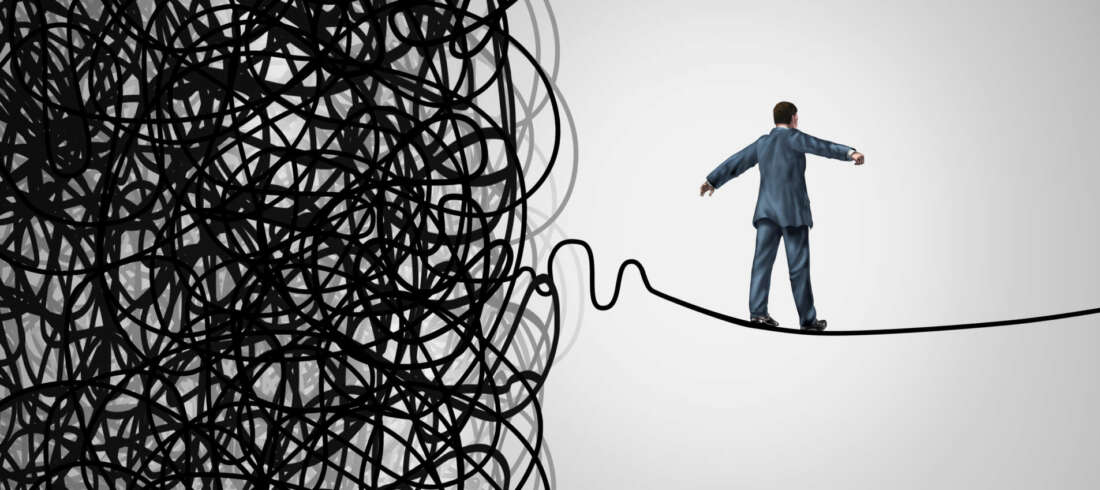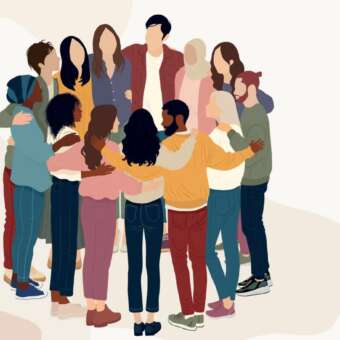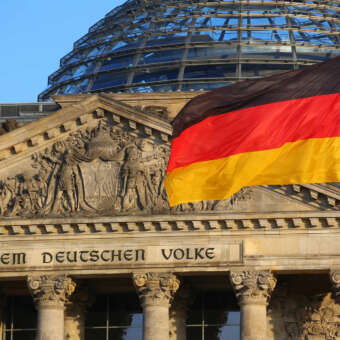In the mental balancing act
The population, vigorously shaken by the overlapping crises, is plagued by insecurities and fears of an uncertain future. People move between resignation, defiance and anger and at the same time long for a confident view of the future.
This article appeared on January 18, 2023 at Neue Gesellschaft Frankfurter Hefte.
Since the outbreak of COVID-19, the world has changed drastically. The corona crisis demanded extraordinary things from people. Everyday things were taken for granted and we experienced a profound powerlessness not only in the face of the virus, but also in the face of the massive restrictions and changes in our everyday lives.
Until shortly before the crisis, we thought we had infinite options for shaping our lives. But then the pandemic brought us an experience of powerlessness the likes of which most people in Germany had never experienced before. At the beginning of the crisis, the mortifying curtailment of our options was cushioned only by the fact that everyone was subject to the same restrictions. This led to solidarity movements and communization in the crisis. We felt close to each other despite the distance requirement. This increasingly changed and gave way to polarization in the population.
When we talk about the effects of the crises in in-depth interviews at the rheingold Institute, it becomes clear how difficult it is to adjust to the new everyday life. In addition to the corona pandemic, from the end of February 2022 the Ukraine war and already for a long time the environmental and energy crisis led to a turning point in time, which was and still is experienced as a drastic break not only politically, but above all personally.
After a good two years of the pandemic, people in Germany complained of a depressed mood in early 2022, feeling trapped in a kind of "melancovid" and reluctant to venture out of their personal shell. This continues to this day. The world in this snail shell is narrow, but at least one thinks oneself safe and comfortable in the manageability. Outside, on the other hand, the uncertain, the overly complex and the unpredictable rage and thus fuel the retreat.
People continue to direct their energy increasingly inward and reduce their circle of life to a small radius; they act less globally and more in an ego-oriented way and in a small circle that can be experienced directly and analogously. Self-referentially being one's neighbor limits not only the radius of life, but also solidarity. The "outside" is increasingly losing its attractiveness and significance, and yet it is elementary for development - beyond all age limits.
The adolescents in the Corona crisis already experienced this to an extreme. Growing up in the pandemic became for them a "growing up in a greenhouse" under controlled conditions in which necessary developmental tasks could only be accomplished with difficulty. Trying things out, interacting with the world, with strangers, going overboard - all necessities for growing up - could only be lived to a very limited extent in the pandemic.
Different mental stress logics
The current crisis is having a tremendous impact on people. However, the individual crises have a different psychological stress potential and follow their own logic.
Climate change follows a linear logic: In 3-4 years, global warming will increase by 1.5 degrees. Psychologically, this seems almost reassuring because it seems predictable. However, this deceptive predictability is dangerous in its trivialization. The corona crisis, on the other hand, obeys an exponential logic, the numbers double, it starts harmlessly at first and gets progressively worse. This logic of excitement finds its counterpart in the social climate: people not only fought against the pathogen, but as an expression of this exponential logic, an excitement spread through the population and quickly led to strong polarization.
The mental strain associated with the events of the war followed a logic of escalation: there was a threat that all civilization could be paralyzed, even destroyed, overnight. At the beginning of the war, this triggered a shock-like effect that also paralyzed the people in Germany, but it did not last long. Soon there was a widespread attempt to suppress the war, people practiced invoking normality and thus kept the horrific images of the war away from themselves. In a kind of war tinnitus, however, the horrific events of the war continued to have an effect and were sometimes more, sometimes less noticeable in everyday life.
This was followed by the self-indulgence of summer. People in Germany wanted to experience sensuality and lightheartedness again; they celebrated themselves and life, treated themselves to their long-awaited vacation, or at least many balmy summer evenings. After this summer break of problems, the specter of uncertainty spread in the energy crisis, coupled with inflation. In an unpredictable threat scenario, people looked anxiously toward the crisis autumn.
Since then, the population, which has been severely shaken by the crises, has found itself in a mentally unsettling transition phase. Inflation, price explosions, war and global warming have formed a threatening backdrop that can be felt in everyday life.
An interweaving of the crises stirs up both fears regarding a worsening of the scenarios or the hope of a mutual relativization along the lines of: a mild winter thanks to the climate crisis will spare us from excessive heating costs. Life has become not only a financial balancing act, but also a mental one.
Division accelerates
Unequal conditions force a division in society - because unlike the virus, inflation does not affect everyone equally. The effects of the crisis are perceived and processed very differently. While households at the upper end of society with lower budgets are able to save and sometimes suppress the signs of crisis by overcompensating with consumption, the others have long been stuck in a financial cul-de-sac. Savings tips are experienced as a mockery of their situation.
Still others have fears of decline and are already struggling to maintain their standard of living, and people in the upper middle of society experience the crisis as a threat, but do not fear a massive collapse in their standard of living. However, the more the indeterminate consequences of crisis and war manifest themselves in events and inflation, the greater the desire for stabilization, self-efficacy and anxiety-reducing manners becomes among them as well. For those for whom saving is not an existential necessity, restrictions can be charged with different meanings that can increase the willingness to save and at the same time stabilize everyday life. By saving in the sense of "less is more," they want to simplify and decelerate life, paving the way for more conscious living. Saving as an expression of solidarity is intended to contribute to social cohesion or resistance to Putin.
Smart saving makes it possible to spend less money without accepting substantial losses and, at the same time, to experience oneself as agile in the face of the crisis. In reassuring saving, for example, one can maintain control through supportive tools such as budget books or savings apps and thus increase one's self-efficacy. Spartan saving, following the example of the ancient Spartans, aims to strengthen personal or societal resilience. In this context, doing without or taking cold showers appears as an act of personal hardening. Moral saving, on the other hand, makes personal restriction an exemplary virtue.
Social cushioning and confidence in the future
The persistence of the crisis is causing the German population to feel insecure and fearful of an uncertain future. It is scratching at their foundations. People move between resignation, defiance and anger and at the same time long for a confident view of the future. As a result of ongoing structural changes, they realize that things will never be the same again and try to settle into the fact that crises will be part of normality in the future. Not only for individuals, but also for politicians, companies and brand managers, the question is: "What do I need, what do I have to do now, so that I can get through the next crises resiliently?"
Practicing resilience, however, does not mean avoiding crises, but rather establishing a risk management system. In the future, both personally and corporately, it will be a matter of confronting crises at different levels, which cannot be planned. We cannot plan a future without crises, but we can learn to deal with crises. People already feel that this requires different structures, different actions and different planning than in the past. At the same time, this holds the opportunity for more creativity and productivity.
This requires transparency, presence and reliability. When politics, companies or even brands go underground in a time of indeterminacy, they increase fear. People now need clear and certain statements they can stick to. In these uncertain times, stabilizing messages also help. To feel, despite all the upheaval, that I can also preserve something, to experience that the world, as it is dear to me, is not completely coming to an end. With a positive outlook on the future as a possible answer to the change of times, the future can be approached with courage.
As a society, we need an honest discussion about our options for countering the curtailments and the accompanying slights, about our rebellion against them, and a weighing of the risks and self-responsible choices for our actions. Even in crisis, there is no simple either-or; there is always a need to renegotiate. It is not the adequate adherence to rules, saving or doing without that inhibits us, but the unconscious clinging to times "before the crisis" that paralyzes us.
We currently feel more than ever that not everything is feasible, but we do not have to remain in the frozen state of motionless powerlessness. If we dare to venture more into the unknown outside, life will pass us by less and the energy will come back into our lives.




